New IAPH-WPSP Weekly Port Economic Impact Barometer reports steady overall port cargo volumes last week with some dips, and significantly reduced passenger and cruise vessel calls. Dockworker availability has been impacted but not hampering operations, while the majority of non-essential port personnel are teleworking from home.
As a further step to regularly inform ports and port users with its World Ports COVID19 Information Portal, the first weekly results of the World Ports Sustainability Programme’s (WPSP) Port Economic Impact Barometer have been published following the response of 67 ports from all over the globe.
Compiled by PortEconomics members Professor Theo Notteboom (Shanghai Maritime University, Ghent University and University of Antwerp) and Professor Thanos Pallis (University of the Aegean and Universidad de Los Andes), ports are asked to report on a weekly basis by answering six key questions.
The overall aim is to inform how ports are responding to the COVID-19 outbreak and to provide both ports and port users with useful trends and indicators over time on crucial issues including vessel call frequency, any restrictions or delays, impact on hinterland cargo transits, storage capacity utilization, and port worker availability.
The first weekly report’s key findings include :
- 35% of the ports report extra restrictions in the last week on all incoming passenger vessels compared to 16% for all container vessels and 14% for all other cargo vessels.
- The COVID19 crisis has resulted in 36% of ports reporting an increase in utilisation of warehousing and distribution facilities for foodstuffs and medical supplies, with some ports reporting capacity shortages. Only 1 out of 10 ports report a minor under-utilisation.
- About 22% of the ports report delays (6-24 hours) or heavy delays (> 24 hours) in cross-border road transportation. One port even indicates cross-border trucking has been discontinued. Overall, 43% of respondents face delays in cross-border trucking activities. For trucks arriving or leaving the port, this figure amounts to 39%, rather evenly split between minor delays (less than 6 hours) and more severe disruptions. Some ports reported that this situation is actually leading to a renewed interest in rail services.
- Over 40% of the ports experience moderate (minus 5% to 25%) and in some ports even significant decreases (in excess of a 25% drop) in the number of calls of container and other cargo vessels. As expected, the cruise/passenger market has been most affected by COVID-19 contagion. Two-thirds of the respondents indicate that passenger vessel calls are down by more than 50%, in some cases even down more than 90%.
Professor Theo Notteboom commented :
“Given the tsunami of announced blank sailings in recent weeks, many ports are yet to experience the full impact of the current crisis on container volumes.”
Professor Thanos Pallis concluded :
“The promising participation in the first edition of our barometer highlights the importance that ports around the globe assign to monitoring and evaluating the impacts of the crisis. We look forward to more ports joining in the next survey. Their data, along with the valuable comments, will further facilitate the development of this report.












